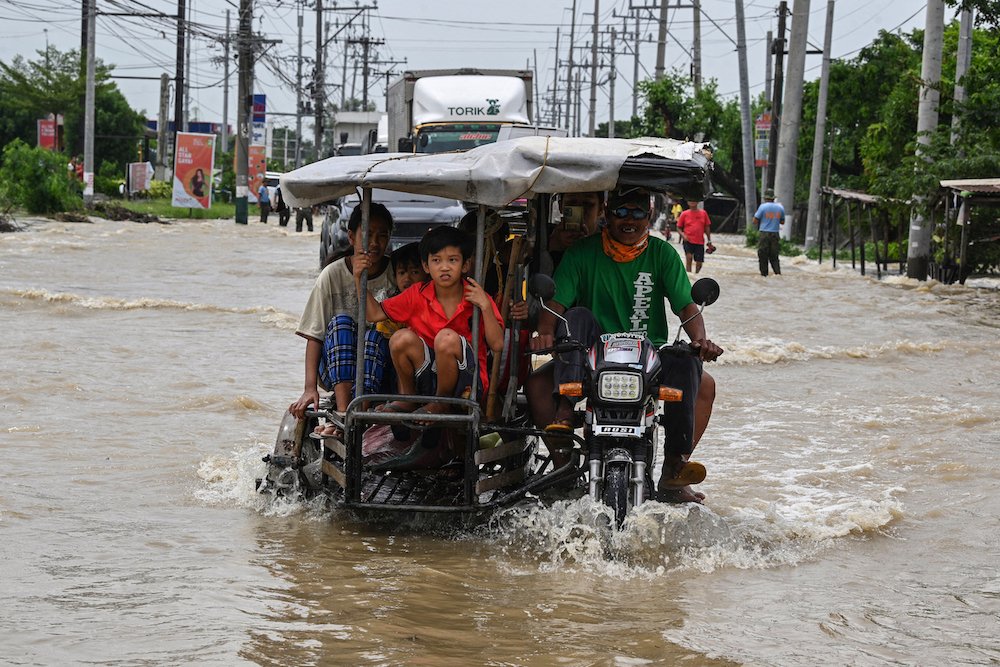MANILA: When a massive typhoon barreled through the Philippines last month, it left behind casualties and destruction, triggering calls for urgent climate action in the cyclone-prone country, where extreme weather events are on the rise.
Super Typhoon Noru, locally named Karding, made landfall on the evening of Sept. 25, sweeping the densely populated island of Luzon and plunging communities in the country’s north underwater.
At least 12 people were killed and over 1 million affected by Noru, according to disaster response officials, who estimate that the landfall caused damages of nearly $51 million, leaving farmland flattened just before the harvest season.
Poor rural communities have increasingly borne the brunt of climate-related disasters, which have battered the Philippines with growing frequency over recent years.
“The stormy season is far from over. We expect our farmers and fisherfolk to face more problems this year from climate change-intensified typhoons,” the Kalikasan People’s Network for the Environment said in a statement.
“We need to improve climate change adaptation mechanisms,” the network’s national coordinator Jon Bonifacio told Arab News. “Typhoon Noru is another wake-up call that we really need to act on the climate crisis.”
With winds of up to 240 kph and heavy rainfall, Noru quickly turned into the most powerful cyclone to hit the Philippines this year.
Emily Padilla, former agriculture undersecretary, who shared on social media photos from devastated areas, wrote after the landfall that it had brought flashbacks of the deadly Typhoon Santi, which struck Luzon in 2013.
“Trembling in fear last night, we had to cling on to God, and work on defending our only sanctuary, when it was being pounded by roaring Karding,” she said on Facebook. “Climate change is real. We must collectively work to reverse the impending death of earth, and so humankind.”
The typhoon had evolved from a tropical storm into a Category 5 typhoon over two days, which was one of the fastest such rapid intensifications ever recorded in the Pacific basin.
“This trend is caused by the effects of climate change, specifically the rising temperatures of the sea surface,” Greenpeace Southeast Asia consultant Jefferson Chua told Arab News.
“More extreme weather events will be coming our way. We are one of the most vulnerable countries to the effects of climate change, and that won’t stop.”
An archipelago of more than 7,000 islands in the Pacific Ocean, the Philippines is highly vulnerable to cyclones. Each year, about 20 typhoons, equivalent to 25 percent of the global occurrence, enter the country and about half of them wreak havoc in its northern parts.
With the changing climate and global warming, the intensity of devastating incidents has increased. Seven of the 11 strongest landfalls in recorded history have occurred since 2006.
Addressing climate change has been high on the agenda of President Ferdinand “Bongbong” Marcos, who during the UN General Assembly in New York last week said that developing countries had suffered the most from climate change effects.
“This injustice must be corrected and those who need to do more must act now,” he said. “Those who are least responsible suffer the most. The Philippines, for example, is a net carbon sink, we absorb (more) carbon dioxide than we emit. And yet, we are the fourth most vulnerable country to climate change.”
But as Marcos addressed UNGA, Greenpeace criticized him for not doing enough on the national level to help avert the disastrous effects of the changing climate, which it said will “heavily impact food security, as well as other fundamental issues such as water, energy, health and poverty alleviation.”
Mitigating the impacts of the changing climate should, according to Greenpeace, start with energy transition efforts in the country, which derives most of its electricity generation from coal.
“The introduction of renewable energy into our energy mix, and the gradual and eventual phaseout from fossil fuels, is one of the biggest solutions that governments can implement in the incoming climate crisis. What’s important here to note is that these are not being done at the level of urgency that we need,” Chua said.




